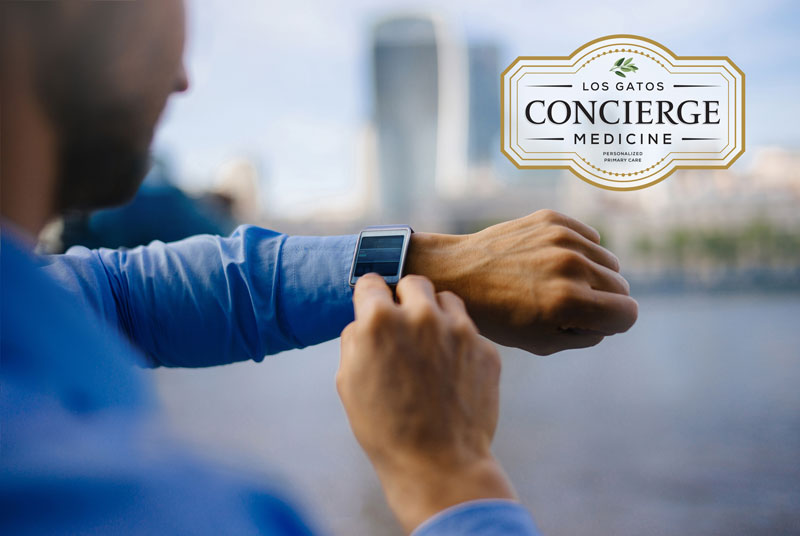Since the 1960s, when wearable technology first appeared as a four-button computer that could fit inside a shoe or on the wrist to game Las Vegas roulette tables, wearable devices have gone mainstream. With the advent of smartphones, smartwatches and more, wearable health trackers are everywhere, representing a significant leap forward in personalized, proactive healthcare.
I’ve used these continuous health monitoring devices in my medical practice both as a hospitalist-based specialist and as a concierge primary care physician to transform how I manage personal health, detect diseases early and interact with healthcare providers. As physicians, our Los Gatos Concierge Medicine team accesses vast amounts of data from these devices to empower our patients to improve their health in ways not previously possible.

Continuous Health Monitoring. One of wearable medical devices’ primary benefits is their ability to provide continuous, real-time health monitoring. Fitness trackers, heart rate monitors, advanced smartwatches, sleep rings and more track a wide array of physiological data, including heart rate, blood pressure, blood oxygen, blood glucose and even electrocardiogram readings. This continuous monitoring can help detect patterns or abnormalities early, often before you experience any symptoms.
Early Disease Detection and Management. Wearable devices play a crucial role in the early detection of health issues. For instance, smartwatches that monitor heart rhythms can alert you to irregularities such as atrial fibrillation, which may require further medical evaluation. Early detection not only enables timely medical intervention but can also significantly reduce the risk of severe health complications.
Enhanced Patient Engagement and Empowerment. Wearable devices empower you by providing immediate feedback about your health and activity levels. This can boost your motivation to take a more proactive role in managing your health, such as improving physical activity, monitoring sleep patterns or making better food choices. Increased engagement and empowerment are critical components in preventive healthcare, often leading to healthy lifestyle changes to help ward off disease.
Personalized Medicine and Treatment Adjustments. The data collected by wearable devices can help doctors tailor medical treatments to your specific needs. For chronic diseases like diabetes, where constant monitoring is crucial, a continuous glucose monitor can prompt real-time adjustments in diet and treatment plans. This personalized approach can lead to more effective management of chronic conditions and better overall health outcomes.
Improved Communication with Healthcare Providers. Wearable medical devices facilitate better communication between you and your healthcare providers. By sharing the data collected by these devices, you can give healthcare professionals a more comprehensive view of your health over time. This can enhance the quality of consultations, improve diagnostic accuracy and foster more informed decision-making.
Cost Effectiveness and Efficiency. Wearable technology can also save you money. By preventing disease progression through early detection and reducing the number of emergency room visits and hospitalizations, these devices can impact what you spend on healthcare. Additionally, devices help make managing chronic conditions more efficient, reducing the overall burden on healthcare systems.
While wearing your health tracker may not translate to roulette winnings, wearable medical devices do improve your chances of better healthcare monitoring, detection, empowerment, personalization and communication. As technology continues to advance, I expect to see even more integration of wearable devices in medical practice, paving the way for more innovative solutions that enhance healthcare and outcomes.
Nancy Wen-Hsing Tibbs, M.D., has practiced as a hospital-based specialist with Sutter since 2000. Los Gatos Concierge Medicine, a membership-based service of Sutter’s Palo Alto Medical Foundation, offers easy access to your doctors, in-depth appointments and coordinated care with specialists at Sutter and beyond. For more information, call 408-523-3344 or visit Sutter Health Concierge Medicine.











